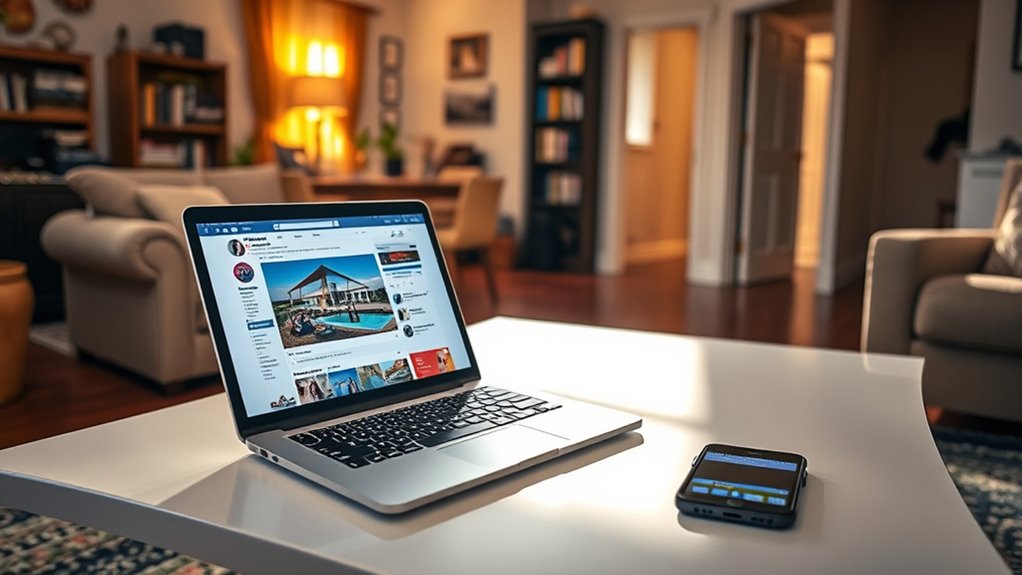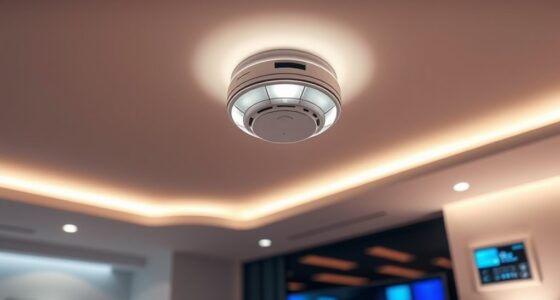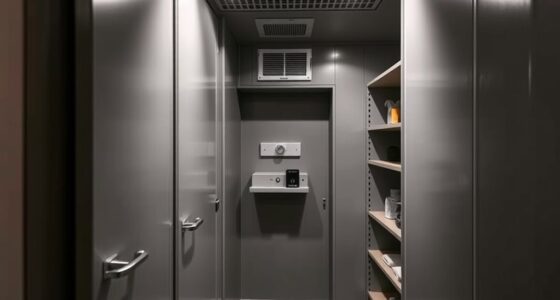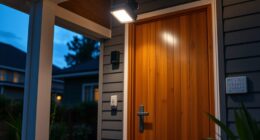Sharing your vacation plans before you leave signals an empty home, increasing theft risk. Posting during extended trips can expose your absence, while revealing your daily routines gives burglars clues about when you’re away. Showcasing valuables or new upgrades might attract unwanted attention, and photos of unsecured doors or windows reveal vulnerabilities. Sharing personal details can identify your location. To keep your home safe, avoid these oversharing pitfalls—more tips await you if you keep going.
Key Takeaways
- Posting trip details or real-time updates can reveal when your home is unoccupied, increasing burglary risk.
- Sharing photos of valuables or home layouts can attract thieves and compromise security.
- Publicly sharing your address or neighborhood details exposes your home’s location to potential intruders.
- Geotagging posts or mentioning landmarks can unintentionally disclose your home’s exact whereabouts.
- Revealing security vulnerabilities, like open doors or camera footage, can help criminals identify entry points.
Sharing Vacation Plans Before You Leave
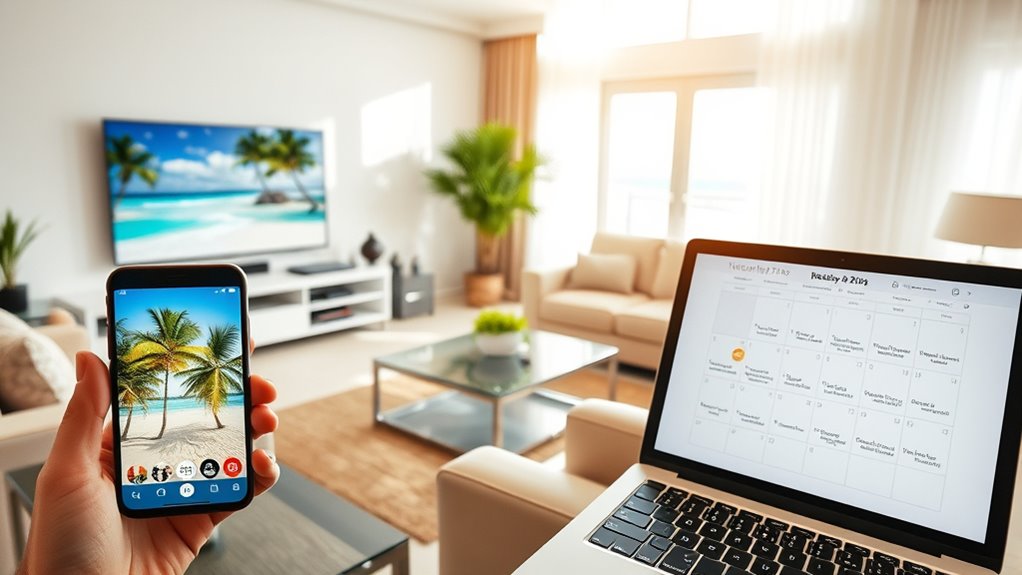
Sharing your vacation plans online before you leave might seem harmless, but it can actually make you an easy target for burglars. When you share details publicly, you’re crossing your privacy boundaries and revealing when your home will be unoccupied. Practicing online discretion helps protect your personal space from potential threats. Avoid posting specific dates or mentioning that no one is home, as this information can be exploited. Instead, wait until you return to share your trip photos and experiences. Remember, the less you reveal about your absence, the safer your home stays. Staying cautious about what you post online keeps your personal information private and reduces your risk of becoming a target. Additionally, understanding the cost of home security systems can help you choose the most effective and affordable way to safeguard your property. Protect your space by being mindful of your online privacy boundaries.
Posting When You’re Away for Extended Periods
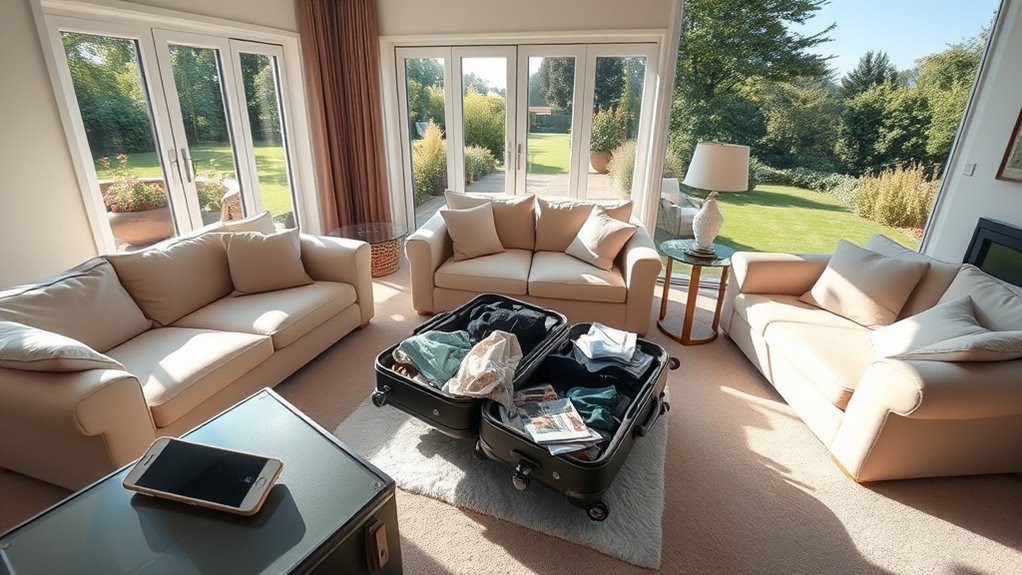
Even if you’ve already posted about your trip plans before leaving, it’s important to be cautious during your extended absence. Oversharing while away can alert burglars that your home is unoccupied. Use these security tips and privacy strategies to stay safe:
- Avoid posting real-time updates about your absence.
- Disable geotags and location sharing on your social media accounts.
- Post photos only after you return home.
- Limit your audience to trusted friends rather than broadcasting to everyone.
Being aware of content sharing practices and how they can impact your security helps prevent potential burglars from tracking your absence. Remember, maintaining privacy during extended trips reduces risks and keeps your home safe. Staying mindful of what you share while away ensures your security tips work effectively, protecting your property and peace of mind.
Revealing Your Full Daily Routine
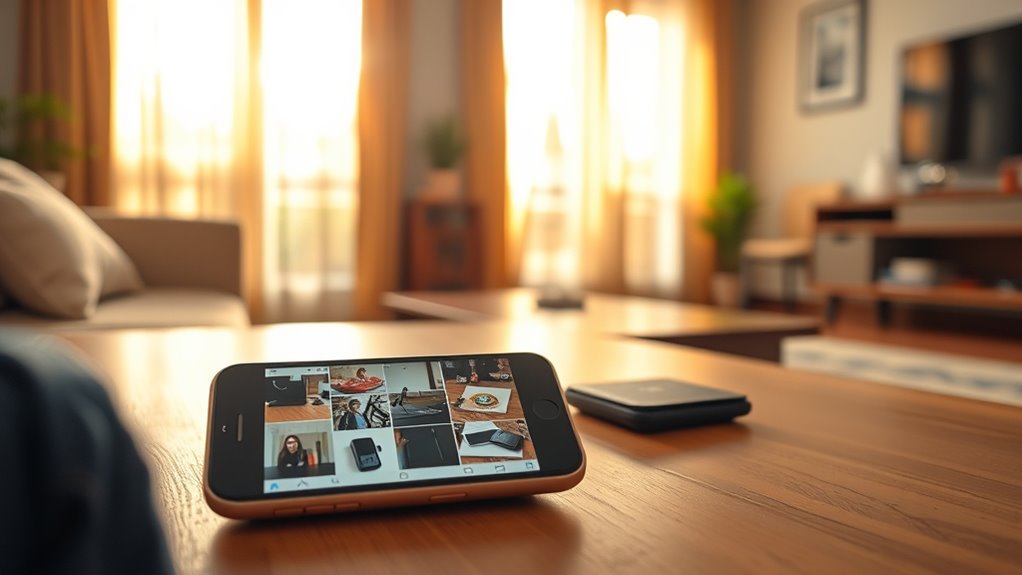
Sharing your full daily routine can give others a detailed look at your life, from your schedules to your home activities. Posting vacation plans or daily schedules might seem harmless, but it also signals when you’re away or busy. Think twice before revealing every detail—your privacy could be at risk. Additionally, oversharing about your home security measures can inadvertently provide potential intruders with valuable information.
Sharing Daily Schedules
Revealing your full daily routine on social media can seem harmless, but it often exposes more than you realize. Sharing detailed schedules can weaken your privacy boundaries and make your home vulnerable. When you post about leaving for work at 8 a.m., picking up groceries at noon, or going to the gym after work, you give potential intruders a clear pattern. Here are some examples:
- Posting your morning departure time.
- Sharing when you’re running errands.
- Announcing your evening activities.
- Mentioning when your house will be empty.
- Being aware of authenticity markers in your online presence helps ensure your shared information remains safe and trustworthy.
Practicing online discretion helps protect your home. Be mindful of how much you reveal about your daily routine, and avoid sharing specifics that could tip off someone with malicious intent. Stay cautious to keep your home safe.
Posting Vacation Plans
Posting your vacation plans on social media can inadvertently expose your entire daily routine, making it easier for burglars to identify when your home will be empty. Sharing detailed travel dates and activities can signal that your house is unoccupied, especially if neighbors aren’t aware of your plans. To protect your privacy, stick to social boundaries and avoid broadcasting specific dates or times. Instead, consider informing trusted neighbors or your neighborhood watch about your trip privately. They can keep an eye on your property without broadcasting your absence publicly. Remember, oversharing online can compromise your security, so be cautious about what you post. Keeping your plans discreet helps prevent potential burglars from exploiting your absence. Additionally, understanding the risks of new payment technologies can help you better safeguard your financial information online.
Revealing Home Activities
When you detail your daily activities online, you give others a window into your entire routine, making it easier for potential burglars to plan their visit. Sharing your full routine—like when you wake up, leave for work, or return home—can unintentionally provide thieves with valuable timing clues. To protect yourself, set social media boundaries and avoid posting real-time updates. For example:
- Mentioning you’re leaving the house in the morning.
- Sharing your work schedule or daily errands.
- Posting about returning home late at night.
- Revealing when you’re on vacation or away for extended periods.
Following these home security tips helps keep your routine private. Be cautious about what you share online, and don’t give away the details that can tip off burglars about when your home is unoccupied. Incorporating awareness of home security best practices further enhances your safety.
Showcasing Valuable Items in Your Home
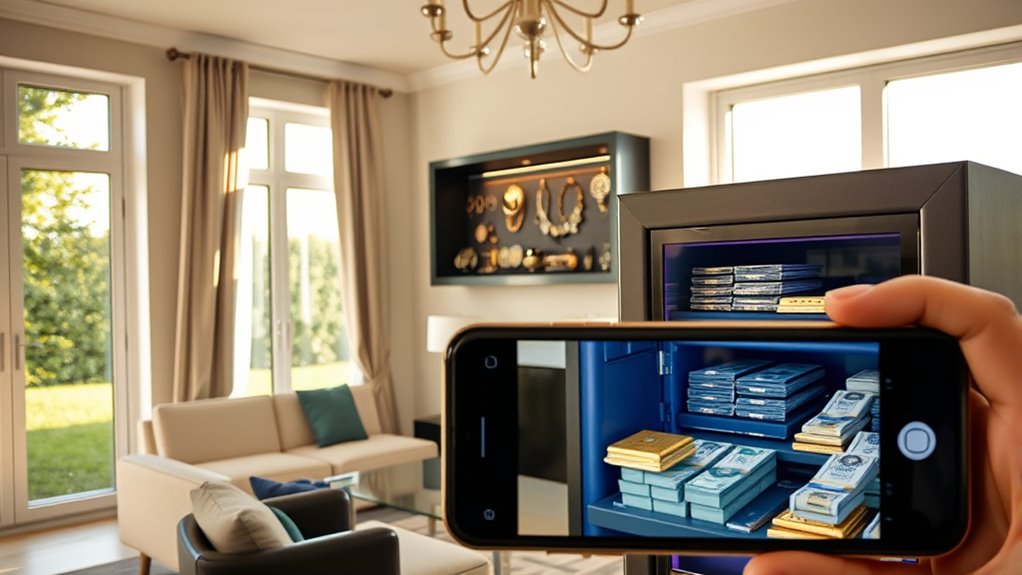
Sharing your valuable items can seem harmless, but it also reveals personal details about your home and possessions. When you showcase specific valuables or detailed layouts, you might unintentionally invite risks. Consider how celebrating unique items could expose more than you realize. Demonstrating leadership potential through online sharing can inadvertently highlight your personal security vulnerabilities.
Revealing Personal Valuables
Showcasing valuable items in your home might seem harmless or even impressive, but it can inadvertently reveal sensitive information about your possessions and lifestyle. When you post photos of your valuables, you might expose details that help burglars plan a break-in. For example:
- Jewelry displayed on a dresser
- Expensive watches on a bedside table
- High-end electronics near windows
- Collections of rare coins or artwork
Even if you have security cameras or alarm systems, revealing these valuables online can attract unwanted attention. Thieves might note security camera placements or find ways to bypass alarm systems once they know what’s inside. Be cautious about what you share—your privacy and safety depend on it. Additionally, understanding home security best practices can help protect your property from potential threats.
Detailed Home Layouts
Posting detailed layouts of your home online can be just as risky as sharing images of your valuables. Thieves can use blueprints or floor plans to identify weak spots in your home security. Even if you think your privacy settings are tight, sharing specifics about your layout makes it easier for someone to plan a break-in. Avoid posting detailed images or descriptions of your home’s interior, including room arrangements or valuable storage areas. Instead, keep your privacy settings restrictive and limit the information you share publicly. Remember, the more you reveal about your home’s layout, the easier it becomes for someone with malicious intent to target you. Protect your home by keeping detailed plans offline and focusing on secure, private sharing. Additionally, understanding the importance of contrast ratio in projectors can help you better appreciate how visual details are presented, underscoring the significance of safeguarding your personal space from unwanted exposure.
Celebrating Unique Items
While it’s tempting to highlight your most prized possessions, revealing too much about your valuable items can attract unwanted attention. Sharing photos of your unique treasures may seem harmless, but it can breach privacy boundaries and compromise your safety. To follow social media etiquette, be selective about what you showcase. For example, you might highlight:
- An antique jewelry collection
- A rare artwork or sculpture
- An heirloom jewelry box
- A vintage camera or collector’s item
Keep details vague, avoid showing specific locations in your home, and consider blurring background items. This way, you can celebrate your treasures without risking your security or violating privacy boundaries. Remember, sharing responsibly helps protect you while still enjoying the joy of showcasing your unique items. Being aware of home security risks and practicing discretion can make all the difference.
Announcing New Purchases or Upgrades

Sharing news about new purchases or upgrades might seem harmless, but it can sometimes invite unwanted attention or even security risks. When you post about a recent home upgrade, like installing a new security system or buying expensive electronics, you’re revealing valuable information about your home security measures. This can alert burglars to vulnerable points or valuable assets. Be mindful of your social media privacy settings, ensuring your posts aren’t visible to everyone. Think twice before announcing big purchases publicly, as it may signal you’re away or have valuable items inside. Instead, share such news selectively and privately. Protecting your home starts with controlling what you broadcast online—stay cautious, and avoid sharing details that could compromise your security.
Posting Photos of Unlocked Doors or Windows
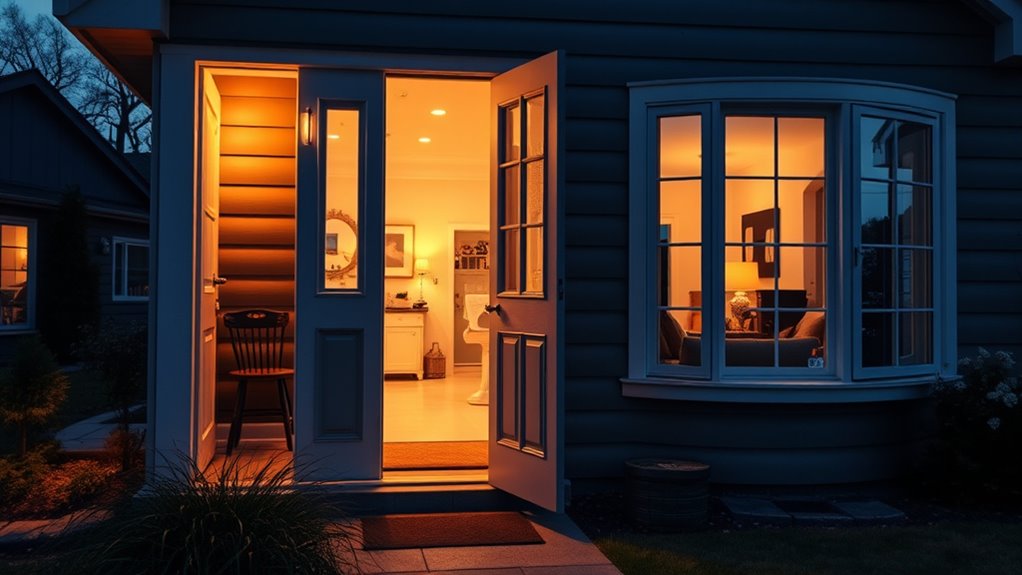
Announcing new purchases or upgrades can inadvertently reveal vulnerabilities in your home security. Posting photos of unsecured doors or windows exposes your home’s weaknesses to potential intruders. When you share these images, you might unintentionally highlight areas that are easy to access. Consider these risks:
Sharing photos of unsecured doors or windows can expose your home to intruders; keep security details private.
- Thieves viewing security camera footage to identify unsecured entry points.
- Neighbors noticing open doors and sending neighborly alerts, which could be shared with others.
- Criminals tracking your routine based on visible unsecured windows.
- Your posts providing a roadmap for break-ins.
Avoid sharing images that show unsecured doors or windows, especially if they reveal security camera footage or other vulnerabilities. Keep these details private to protect your home from opportunistic criminals.
Sharing Personal Details That Could Identify Your Location
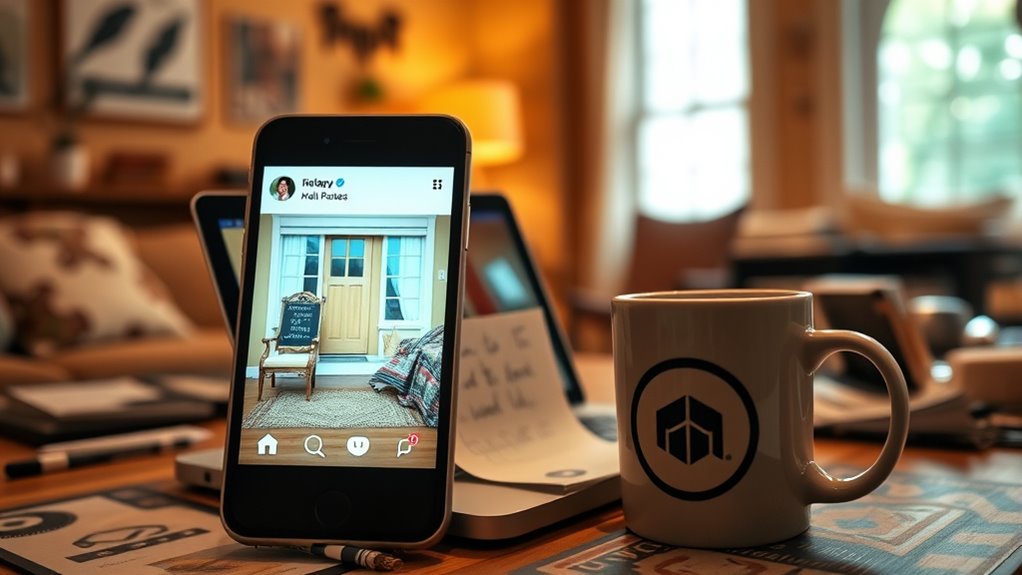
Even seemingly harmless details can reveal your location if shared publicly. When you post about your daily routines or favorite spots, you might unintentionally give away your whereabouts through online location sharing. For example, mentioning specific landmarks or neighborhoods can help others pinpoint where you live. Additionally, personal address disclosure—such as sharing your street name or city—puts your home at risk. Cybercriminals and burglars often scan social media for such clues to target homes. Be cautious about revealing too much personal information and avoid geotagging posts unless necessary. Remember, the more details you share, the easier it becomes for someone to identify your location. Protect your privacy by keeping your location details private and thinking twice before posting personal information online.
Frequently Asked Questions
How Can I Limit Access to My Social Media Profiles?
To limit access to your social media profiles, start by reviewing and adjusting your privacy settings. Make your profiles private so only approved friends can see your posts. You can also set account restrictions to prevent strangers from viewing your content or sending messages. Regularly update these settings to maintain control over who accesses your information, ensuring your personal details stay secure and your online presence remains private.
Are There Best Practices for Setting Privacy Controls?
When setting privacy controls, you should regularly review your privacy settings and utilize security features offered by platforms. Adjust who can see your posts, limit profile visibility, and control friend or follower access. Enable two-factor authentication for added security, and restrict sharing options for sensitive information. Staying proactive with these best practices helps protect your personal details and keeps your account secure from potential threats.
What Are Signs Someone Is Monitoring My Online Activity?
Keep your eyes peeled for signs someone’s monitoring your online activity—they might be fishing for information. If you notice suspicious account activity or receive unexpected emails, it’s a red flag. Phishing scams can be sneaky, so stay vigilant. You might also see strange logins or data requests. Trust your instincts; if something feels off, change your passwords and check your privacy settings. Better safe than sorry!
How Do I Recover if My Home Details Are Leaked Online?
If your home details leak online, start by removing the info from all platforms and updating your privacy settings. Contact the site administrators to request removal if necessary. Monitor your online reputation regularly and consider using reputation management tools. To prevent future leaks, be cautious about sharing personal data and adjust your privacy settings. Staying vigilant helps protect your privacy and keeps your home safe from potential threats.
Should I Notify Neighbors About My Social Media Sharing Habits?
Like a lighthouse guiding ships through fog, sharing your social media habits with neighbors can illuminate neighborhood awareness, but also cast shadows on your privacy concerns. If you’re worried about security, informing neighbors helps create a watchful community. However, if your posts reveal too much, it may be best to keep your circle small. Balancing openness with discretion guarantees your home stays safe without sacrificing neighborly bonds.
Conclusion
Be mindful of what you share online, because a little knowledge can go a long way for someone with bad intentions. Even seemingly harmless posts can give away your plans or valuable details about your home. Remember, don’t open Pandora’s box—once private info slips out, it’s hard to put the genie back in the bottle. Stay vigilant and keep your personal life protected behind closed doors, both online and off.
